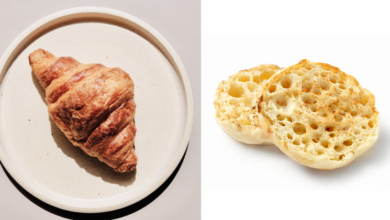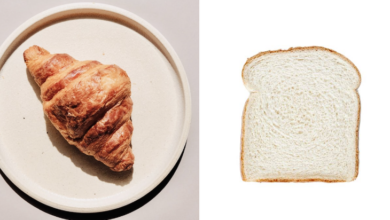Croissant Vs. Donut: The Sweet and Savory Face-Off

What To Know
- The choice between a croissant and a donut ultimately depends on personal preference and occasion.
- Croissants offer a delicate, flaky texture and a buttery flavor, while donuts provide a denser, cake-like texture and a wide range of flavors.
- Whether you prefer the delicate elegance of a croissant or the comforting sweetness of a donut, there’s no denying the allure of these breakfast favorites.
In the realm of breakfast pastries, two culinary icons stand tall: the croissant and the donut. Both have captivated taste buds and sparked debates for decades, leaving many wondering which reigns supreme. This blog post delves into the fascinating world of croissants and donuts, exploring their origins, flavors, textures, and cultural significance. Join us on this delectable journey as we uncover the unique characteristics that set these two pastries apart.
A Brief History:
Croissants:
The croissant’s origins can be traced back to Austria, where it was known as the “kipferi.” This crescent-shaped pastry made its way to France in the 19th century and quickly gained popularity. Today, it is a staple in French bakeries and a beloved breakfast treat worldwide.
Donuts:
Donuts, on the other hand, have a more humble beginning. They originated in the Netherlands in the 17th century and were initially called “olykoeks,” meaning “oily cakes.” Dutch immigrants brought donuts to America in the 19th century, where they became a staple of coffee shops and diners.
Taste and Texture:
Croissants:
Croissants are known for their delicate, flaky texture, achieved through a labor-intensive process called laminating. This technique involves folding and rolling layers of dough and butter, creating a pastry that is light and airy. The flavor of a croissant is buttery and slightly sweet, with a hint of yeast.
Donuts:
Donuts, in contrast, have a denser, cake-like texture. They are made with a simple dough that is fried or baked, resulting in a soft and fluffy interior. The flavor of donuts can vary widely, depending on the type of glaze, frosting, or filling used.
Cultural Significance:
Croissants:
In France, croissants are deeply ingrained in the culture. They are often served as part of a traditional breakfast or brunch, accompanied by coffee or hot chocolate. Croissants also make an appearance in various celebrations, such as weddings and birthdays.
Donuts:
Donuts have become a symbol of American pop culture. They are associated with coffee breaks, road trips, and the iconic donut shops that dot the country. Donuts have also been featured in countless movies, TV shows, and songs, further solidifying their place in American culture.
Health and Nutrition:
Croissants:
Croissants are not typically considered a health food. They are high in calories, fat, and carbohydrates, with a relatively low nutritional value. However, they can be enjoyed in moderation as part of a balanced diet.
Donuts:
Donuts are generally less nutritious than croissants. They are often high in sugar, unhealthy fats, and calories, with minimal nutritional value. Consuming donuts excessively can contribute to weight gain and other health concerns.
Versatility:
Croissants:
Croissants can be enjoyed on their own or as a base for various fillings. They can be filled with sweet or savory ingredients, such as chocolate, ham, cheese, or eggs. Croissants can also be used to make sandwiches, pastries, and other culinary creations.
Donuts:
Donuts are incredibly versatile and can be customized in countless ways. They can be glazed, frosted, filled, or topped with a variety of ingredients, from sprinkles and nuts to bacon and maple syrup. Donuts can also be incorporated into desserts, such as donut cakes and donut holes.
Which One to Choose?
The choice between a croissant and a donut ultimately depends on personal preference and occasion. Croissants offer a delicate, flaky texture and a buttery flavor, while donuts provide a denser, cake-like texture and a wide range of flavors. If you’re looking for a lighter, more sophisticated pastry, a croissant might be the better choice. If you’re craving a sweet, indulgent treat, a donut might be more satisfying.
The Verdict:
Croissants and donuts are both delicious pastries with unique characteristics and cultural significance. While they may differ in taste, texture, and nutritional value, they both hold a special place in the hearts of pastry lovers worldwide. Whether you prefer the delicate elegance of a croissant or the comforting sweetness of a donut, there’s no denying the allure of these breakfast favorites.
The Conclusion:
The croissant and the donut, like two celestial bodies in the pastry universe, continue to shine brightly, captivating taste buds and inspiring culinary adventures. Their contrasting textures, flavors, and cultural significance make them enduring symbols of breakfast bliss. So, the next time you find yourself faced with this delectable dilemma, embrace the joy of choice and indulge in the pastry that speaks to your soul.
Answers to Your Questions
1. Which pastry is healthier, a croissant or a donut?
In general, croissants are considered to be slightly healthier than donuts. They are typically lower in sugar and unhealthy fats, and they provide some essential nutrients, such as protein and fiber. However, both pastries should be consumed in moderation as part of a balanced diet.
2. Can croissants be made at home?
Yes, croissants can be made at home, although the process is time-consuming and requires some skill. There are numerous recipes and tutorials available online that can guide you through the steps of making croissants at home.
3. What are some popular donut flavors?
Donuts come in a vast array of flavors, including classic favorites like glazed, chocolate, and Boston cream, as well as more unique and creative flavors like maple bacon, red velvet, and peanut butter and jelly.
4. How can I store croissants and donuts properly?
Croissants and donuts should be stored in an airtight container at room temperature for up to 2 days. For longer storage, they can be frozen for up to 2 months. When ready to serve, croissants can be reheated in a warm oven or toaster oven, while donuts can be microwaved briefly.
5. Are there any vegan or gluten-free alternatives to croissants and donuts?
Yes, there are vegan and gluten-free alternatives available for both croissants and donuts. These alternatives are made with plant-based ingredients and gluten-free flours, allowing individuals with dietary restrictions to enjoy these delicious pastries.





